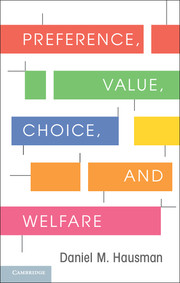Book contents
- Frontmatter
- Contents
- Figures
- Preface
- 1 Preferences, Comparative Evaluations, and Reasons
- Part I Preferences in Positive Economics
- 2 Preference Axioms and Their Implications
- 3 Revealed-Preference Theory
- 4 Preferences, Decision Theory, and Consequentialism
- 5 Game Theory and Consequentialism
- 6 Constraints and Counterpreferential Choice
- Part II Preferences, Welfare, and Normative Economics
- Part III Psychology, Rational Evaluation, and Preference Formation
- References
- Index
6 - Constraints and Counterpreferential Choice
from Part I - Preferences in Positive Economics
Published online by Cambridge University Press: 05 June 2012
- Frontmatter
- Contents
- Figures
- Preface
- 1 Preferences, Comparative Evaluations, and Reasons
- Part I Preferences in Positive Economics
- 2 Preference Axioms and Their Implications
- 3 Revealed-Preference Theory
- 4 Preferences, Decision Theory, and Consequentialism
- 5 Game Theory and Consequentialism
- 6 Constraints and Counterpreferential Choice
- Part II Preferences, Welfare, and Normative Economics
- Part III Psychology, Rational Evaluation, and Preference Formation
- References
- Index
Summary
In Chapters 4 and 5, I developed a view of consequentialist explanation and prediction that relies on a notion of preferences as total subjective comparative evaluations – rankings that reflect all relevant evaluative considerations and combine with beliefs to determine choices. This view of preferences and of their role in explanation and prediction dominates the practice of mainstream economics. Consequentialism is a sensible explanatory and predictive strategy.
In this approach to explanation and prediction, the panoply of factors that influence people’s actions – their plans and passions, their whims and wishes, their tastes and temptations – must all find their place within an agent’s preferences and beliefs. I have maintained that this is the way that economists understand choices and that it is a reasonable way to proceed.
Information
- Type
- Chapter
- Information
- Preference, Value, Choice, and Welfare , pp. 57 - 74Publisher: Cambridge University PressPrint publication year: 2011
